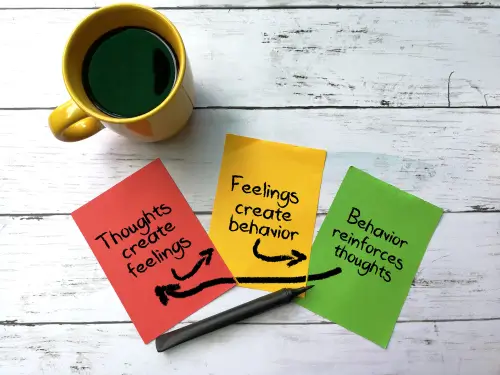Los Angeles is a city known for its vibrant culture and iconic landmarks. The city is also flourishing with a landscape rich in mental health resources, including Cognitive Behavioral Therapy (CBT).
What is CBT, and what can it be used for? That is a question that many people have, especially when navigating disorders like ADHD, PTSD, and more. Understanding the intricacies of this therapy can help individuals identify if CBT is a valid course of treatment.

What is Cognitive Behavioral Therapy?
Cognitive behavioral therapy (CBT) is a structured, time-limited therapy that identifies and changes negative thought patterns and behaviors contributing to emotional distress and mental health issues. Developed in the 1960s by Aaron T. Beck, CBT is grounded in the principle that our thoughts, feelings, and behaviors are intricately linked, and modifying negative thought patterns can lead to changes in feelings and behaviors.
Working Mechanism
CBT operates on the strategy of confronting and modifying irrational thoughts and beliefs. It encourages individuals to develop more balanced and realistic thought patterns. CBT employs various techniques, including Socratic questioning, guided discovery, and behavioral experiments.
What Does CBT Treat?
Mental health awareness has surged nationwide, with many CBT providers now available in Los Angeles. This growth is fueled by the increasing recognition that mental health disorders, despite being invisible, are indeed real and prevalent. CBT providers can help individuals who suffer from numerous disorders, including:
- Anxiety Disorders: CBT has proven to be exceptionally effective in treating various anxiety disorders, aiding individuals in managing symptoms of generalized anxiety disorder, panic disorder, social anxiety, and phobias.
- Depression: CBT offers substantial relief to individuals grappling with depression, helping them break the cycle of negative thought patterns that often fuel depressive symptoms.
- Obsessive-Compulsive Disorder (OCD): For those with OCD, CBT aids in identifying and changing obsessive thought patterns, reducing compulsive behaviors.
- Post-Traumatic Stress Disorder (PTSD): CBT emerges as a potent tool in managing PTSD, assisting individuals in processing traumatic experiences and reducing hyperarousal and avoidance symptoms.
Read more: Do I Have Male Borderline Personality Disorder?

The Specifics of Cognitive Behavioral Therapy
When undergoing CBT for mental health, it is important to understand that structure is everything. A provider will create the best treatment plan for diagnosing the individual they are treating. Depending on the diagnosis, a CBT plan may entail:
- Session Structure: CBT sessions are typically structured, involving an assessment of the individual’s week, setting an agenda for the session, reviewing the previous session’s homework, and introducing new concepts and strategies to aid in the healing process.
- Homework Assignments: An essential component of CBT is the homework assignments, which encourage individuals to apply the strategies learned in therapy to their daily lives, fostering gradual change.
- Skills Training: CBT involves skills training where individuals learn strategies to manage symptoms effectively, including relaxation techniques, stress management, and assertiveness training.
- Duration of Therapy: CBT is generally a short-term therapy, typically lasting 5 to 20 sessions, based on the individual’s progress and the complexity of the issues addressed.
What to Expect During CBT?
CBT is more than just a list of expectations and exercises. For those with anxiety or anxiety-related mental health disorders, starting something new can be a trigger. Understanding what to expect when undergoing CBT can be as beneficial as the treatment. If you are getting ready to start CBT – here is what you can expect:
- Collaborative Approach: CBT emphasizes a collaborative approach, where the therapist and the individual work together to identify goals and develop strategies to achieve them.
- Active Participation: Engaging in CBT requires active participation, with individuals encouraged to take a hands-on approach to their healing process.
- Emotional Journey: Embarking on CBT often involves navigating through a spectrum of emotions as individuals confront and work through deep-seated issues and beliefs.
- Focus on the Present: CBT mainly focuses on the present, assisting individuals in identifying and modifying current thought patterns and behaviors that are causing distress.
While this can seem overwhelming, professionals providing CBT for mental health conditions know how to implement it with minimal disruption to daily life. Thanks to the approach of CBT, many individuals living in Los Angeles have been able to change their thought patterns and overcome the mental health conditions that have held them hostage in the past. Following the plan created for you by a skilled professional is imperative for successful CBT treatment.
Read more: A Complete Guide To Dual Diagnosis Treatment Centers

Cognitive Behavioral Therapy in Los Angeles From Launch Centers
Choosing cognitive behavioral therapy in Los Angeles from a skilled provider is the first step if you are looking for mental health treatment. Launch Centers can help you explore the possibility of starting a plan that involves CBT.
If you or someone you love suffers from anxiety, depression, OCD, PTSD, or other mental health disorders – choosing CBT from our Los Angeles center may help. Our staff is skilled in creating the right CBT plan that caters to an individual’s needs. Our holistic approach integrates skill development and individualized strategies, fostering all-round development and well-being.
Call us today to begin your journey with CBT in Los Angeles.





